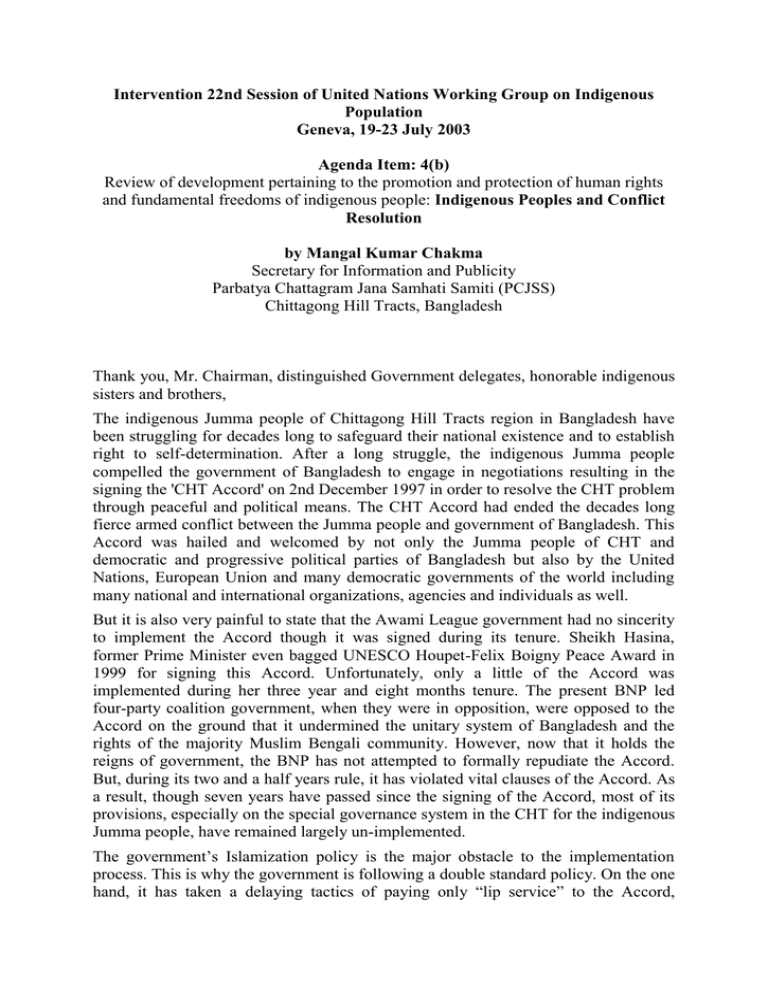Intervention 22nd Session of United Nations Working Group on Indigenous Population
advertisement

Intervention 22nd Session of United Nations Working Group on Indigenous Population Geneva, 19-23 July 2003 Agenda Item: 4(b) Review of development pertaining to the promotion and protection of human rights and fundamental freedoms of indigenous people: Indigenous Peoples and Conflict Resolution by Mangal Kumar Chakma Secretary for Information and Publicity Parbatya Chattagram Jana Samhati Samiti (PCJSS) Chittagong Hill Tracts, Bangladesh Thank you, Mr. Chairman, distinguished Government delegates, honorable indigenous sisters and brothers, The indigenous Jumma people of Chittagong Hill Tracts region in Bangladesh have been struggling for decades long to safeguard their national existence and to establish right to self-determination. After a long struggle, the indigenous Jumma people compelled the government of Bangladesh to engage in negotiations resulting in the signing the 'CHT Accord' on 2nd December 1997 in order to resolve the CHT problem through peaceful and political means. The CHT Accord had ended the decades long fierce armed conflict between the Jumma people and government of Bangladesh. This Accord was hailed and welcomed by not only the Jumma people of CHT and democratic and progressive political parties of Bangladesh but also by the United Nations, European Union and many democratic governments of the world including many national and international organizations, agencies and individuals as well. But it is also very painful to state that the Awami League government had no sincerity to implement the Accord though it was signed during its tenure. Sheikh Hasina, former Prime Minister even bagged UNESCO Houpet-Felix Boigny Peace Award in 1999 for signing this Accord. Unfortunately, only a little of the Accord was implemented during her three year and eight months tenure. The present BNP led four-party coalition government, when they were in opposition, were opposed to the Accord on the ground that it undermined the unitary system of Bangladesh and the rights of the majority Muslim Bengali community. However, now that it holds the reigns of government, the BNP has not attempted to formally repudiate the Accord. But, during its two and a half years rule, it has violated vital clauses of the Accord. As a result, though seven years have passed since the signing of the Accord, most of its provisions, especially on the special governance system in the CHT for the indigenous Jumma people, have remained largely un-implemented. The government’s Islamization policy is the major obstacle to the implementation process. This is why the government is following a double standard policy. On the one hand, it has taken a delaying tactics of paying only “lip service” to the Accord, without implementing it, on the other hand, it is relentlessly going on with its vigorous Islamization policy in secret. I would like to take this opportunity to raise my concern that UNESCO and the United Nations have a moral responsibility to give necessary attention to the implementation of the Accord, as UNESCO, a specialised agency of United Nations, had awarded then Prime Minister Sheikh Hasina with the Houpet-Felix Boigny Peace Award 1999 for her leadership on the events leading to the signing of the CHT Accord. I would also like to mention here that Bangladesh has ratified many important human rights instruments, including ILO Convention 107 and CERD, but remains largely lethargic towards its international treaty obligations. The Jumma people are still under military rule through the Operation Uttoron (Upliftment). Under this Operation Uttoron the army personnel can commit any kind of atrocity with impunity. In the recent past, they, in collaboration with the local administration and police and the Bengali settlers committed six large-scale atrocities even during the post-Accord period after 1997. With this backdrop, I, on behalf of the PCJSS as well as indigenous Jumma people, would like to appeal to the international community including UN to influence the government of Bangladesh for: (1) Immediate implementation of the CHT Accord in letter and spirit; (2) Demilitarization of the CHT region; (3) Stopping of Bengali Muslim infiltration into the CHT and immediate withdrawal of the government-sponsored Bengali Muslim settlers from the CHT region to their original homeland. Thank you Mr. Chairman.




